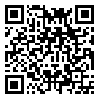BibTeX | RIS | EndNote | Medlars | ProCite | Reference Manager | RefWorks
Send citation to:
URL: http://rjms.iums.ac.ir/article-1-3805-en.html
Background and Objectives: Diabetes is common among chronic diseases. Various factors such as personality and psychological traits have role in self-care and control in this disease Aim of This study is determination the relationship between self- care and locus of control in patients with type 2 diabetes. Method: This cross-sectional study carried out on 180 patients with diabetes mellitus type2 whom are members of diabetic association in city of Babylon. The sampling method was Simple random sampling. Data collection tools were Form C standard questionnaire Multidimensional Health Locus of Control (MHLC), abstract scale for self-care activities in diabetics (SDSCA) and Multidimensional scale for Health Locus of Control (MHLC).The data in SPSS (19) using descriptive statistics (frequency, percentage, mean and standard deviation) and analytical (Pearson correlation co-efficient, regression analysis and independent t-test) were analyzed. Results: the self- care score had a positive correlation with the inner locus of control score (r=.38, P =.01) and a negative correlation with the chance locus of control (r=-.53, P =.01). Self-care behavior and health of a significant relationship between external locus of control was not prepared. Also, the behavior of self-care and education (001/0 = P), the locus of control and education (01/0 = P) and locus of control risk education (001/0 = P) significant relationship was observed. Conclusions: improve internal locus of control and loss of control locus should be noted in the interventional program for promoting self-care behaviors in these patients.





